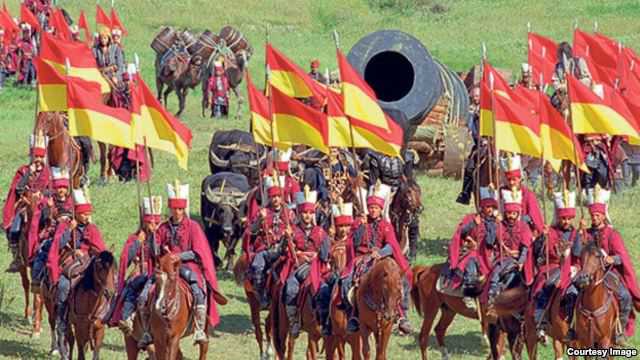By Dorian Jones

Turkish director Faruk Aksoy’s film “Conquest 1453” about the fall of Constantinople was lavishly produced with a budget of $17 million.
ISTANBUL — After the formation of the Turkish secular state on the ruins of the Ottoman Empire, reference to the country’s imperial era was generally frowned upon.
But the days of Turkey ignoring its past are history.
Turkey is no longer hesitant to put its former glory on display both at home and in its old imperial stomping grounds, where “neo-Ottomanism” is being employed as a foreign-policy tool.
As one filmmaker puts it, the time has come to tell Turkey’s story to the world.
And based on the record crowds who flocked this week to see his new film about the conquest of Constantinople, it’s a story people are eager to hear.
Faruk Aksoy’s lavishly produced “Conquest 1453” relies on a heavy dose of violence, sex, and symbolism to remind viewers how Ottoman Sultan Mehmed II conquered the heart of the Byzantine Empire and renamed it Istanbul.
Benefitting from a budget of $17 million — with a number of state-controlled entities chipping in to make it the country’s most expensive production ever — Aksoy was able to set his sights high.
“The conquest of Istanbul is an extraordinarily spectacular event with all its outcomes,” he says. “It is an event that changed the course of world history and I want to tell this story to the whole world; not only to the Turkish people. Looking at the increasing demand from abroad we feel that we can achieve this.”
Rediscovering The Ottoman Past
In its home country 1.4 million people saw “Conquest 1453” in its opening weekend. It is predicted it will soon shatter all the country’s previous box-office records within weeks.
The film’s success can, in many respects, be explained by the country’s ongoing love affair with its rediscovered Ottoman past.
Turkish TV viewers have been tuning in en masse to watch “The Magnificent Century” (“Muhtesem Yuzyil”), a fictional account of the peak of the Ottoman Empire that has become the country’s most popular soap opera.
WATCH: The Official trailer for “Conquest 1453”
Moreover, many Turks have been flocking to Panorama 1453, a 2-year-old museum in the shadow of Istanbul’s city’s walls, which provides a vivid, panoramic view of the conquest of Constantinople.
For many visitors it is all about rediscovering their history. “Our Turkish heritage has not been told to us and that should change,” one visitor to the museum told RFE/RL.
Another visitor claimed the Ottoman Empire compared favorably to others. “We have been one of the great powers in the past, but unlike other great powers we have never been imperialistic,” he said.
Such positive interpretations of history have flourished under the decade-long rule of the Islamic-oriented Justice and Development Party (AKP).
With record economic growth transforming the country from the “sick man” of Europe to European tiger, a historical reawakening fits well with the AKP’s vision.
“They are looking at the glory days of the empire, and a rather ‘ahistorical’ reading of that history prevails,” says Soli Ozel, an academic and columnist for the Turkish newspaper “HaberTurk.”
“Basically, [they are giving] the message to society that we have now prepared the country for great days, just like the Ottomans did in the 15th and 16th centuries. It’s one way of legitimizing this current government and of allowing people to imagine its foreign policy in such grandiose terms.”
‘Neo-Ottomanism’
The message extends far beyond popular culture.
Turkish officials have been keen to employ “neo-Ottomanism” as a means of extending the country’s influence across Arab Spring countries.
When addressing the Arab League in Cairo last year, Prime Minister Recep Tayyip Erdogan was keen to remind those attending of their Ottoman past. “We share a common a history, faith and values,” he said. “We are all brothers.”
And Foreign Minister Ahmet Davutoglu has gone further, arguing that under Ottoman rule the Middle East enjoyed peace and stability, in marked contrast to the region’s recent past.
Such references may fail to resonate among many, especially those who consider the Ottoman era one of domination, not success.
But buoyed by economic prosperity, growing regional diplomatic prowess, and blockbuster films that could do well internationally, Turkey appears only too happy to take its chances by drawing parallels to the last time it enjoyed such power and prestige.
via Turkey Goes Retro With Blockbuster Ottoman Film.